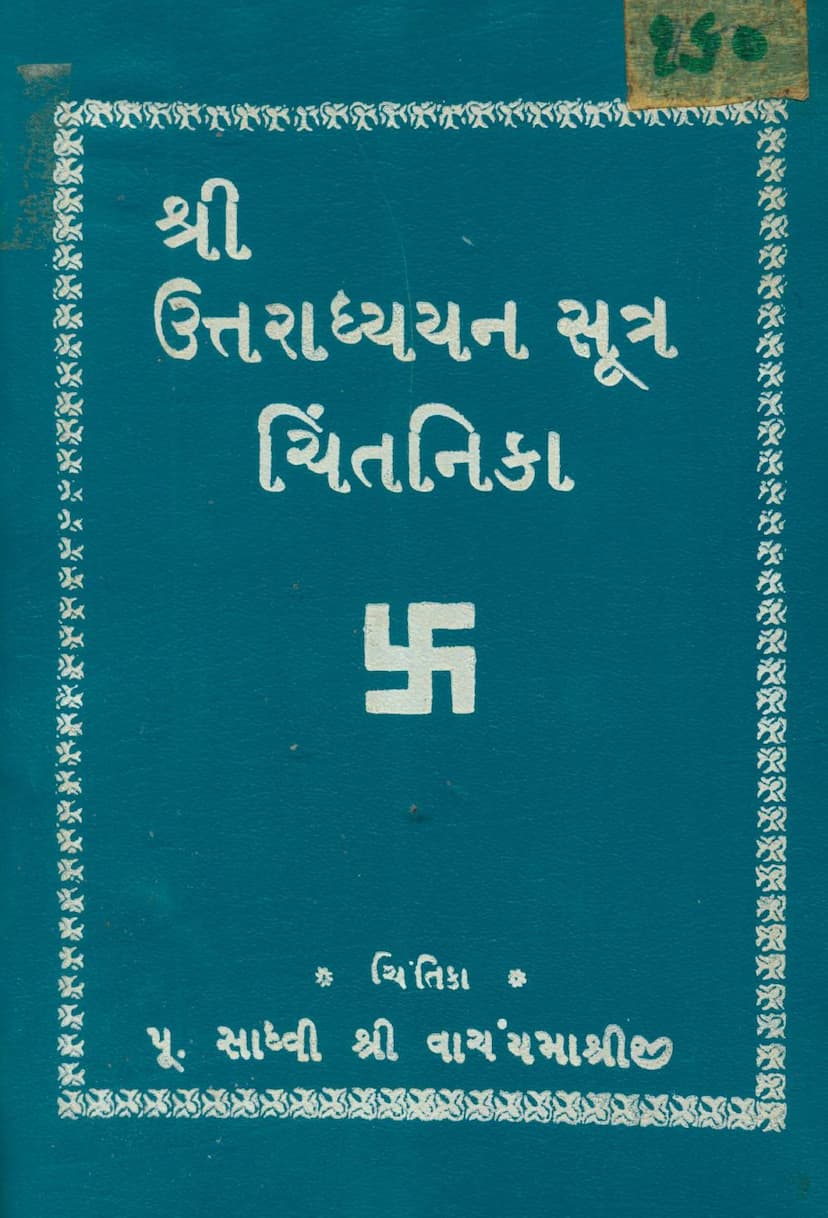Uttaradhyayan Sutra Chintanika
Added to library: September 2, 2025

Summary
This is a comprehensive summary of the Jain text "Uttaradhyayan Sutra Chintanika" authored by Sadhvi Vachyamashreeji, published by Labdhi Vikramsuri Sanskruti Kendra, based on the provided pages.
Overall Theme and Purpose:
The Uttaradhyayan Sutra Chintanika, as its title suggests, is a contemplation and elucidation of the Uttaradhyayan Sutra, considered a fundamental and profound Jain scripture. The book aims to make the teachings of this sacred text accessible and relatable, particularly to a contemporary audience. It delves into the spiritual and practical aspects of Jain philosophy, emphasizing the path to liberation (moksha) through virtuous conduct, self-control, and renunciation. The Chintanika encourages readers to engage in introspection, understand the nature of reality, and adopt a lifestyle aligned with Jain principles.
Key Aspects and Content:
The provided pages reveal a structure that includes:
- Invocation and Gratitude (Page 2): The book begins with a series of invocations and expressions of gratitude to various revered figures in Jainism, including Lord Mahavir, Lord Gautam Swami, Lord Sudharma Swami, Acharya Bhadrabahuswami, Acharya Shantisurishwarji, and the author's gurus (Dada Gurudev Labdhisurishwarji and Gurudev Vikramsuri). This highlights the lineage of knowledge and the importance of guru-shishya tradition.
- Acknowledgements and Dedication (Pages 3, 7, 9): The work is dedicated to spiritual guides, and there are acknowledgements to contributors and patrons who have supported its publication. This reflects a community effort in disseminating spiritual knowledge.
- Foreword/Editorial (Pages 11-21): Authored by Acharya Vikramsurishwarji, this section provides a strong endorsement and context for the book. It emphasizes the need for pure and soul-awakening literature in contrast to morally corrupting texts. The Acharya praises the author's ability to distill the essence of complex scriptures like the Uttaradhyayan Sutra into accessible "Chintanikas" (contemplations). He highlights the Uttaradhyayan Sutra's significance as the final discourse of Lord Mahavir, a treasure trove for spiritual seekers, and a source of profound detachment. He particularly commends the author's unique ability to present these profound concepts in an engaging and relatable manner, drawing on the wisdom of previous commentators.
- Author's Note ("Mari Vaat" - My Story) (Pages 22-32): Sadhvi Vachyamashreeji shares her personal journey and inspiration behind writing this work. She recounts her spiritual upbringing, her deep reverence for the Uttaradhyayan Sutra, and the pivotal moments that led her to undertake this project, often influenced by the guidance and encouragement of her gurus. This section provides a personal and devotional context to the scholarly work.
- Publisher's Note (Pages 33-38): This section details the publication details, the aim of the publishing house (Shri Labdhi-Vikramsurishwar Sanskriti Kendra) in promoting Jain literature, and acknowledges the supporters and donors. It also mentions the demand for similar works, like the "Dashavaikalik Sutra Chintanika," indicating a successful approach to making scriptures accessible.
- Table of Contents (Pages 37-45): This lists the "Pad" (verses/stanzas) from the Uttaradhyayan Sutra that are being contemplated, along with their chapter numbers and page references within the book. This provides a structured overview of the book's content.
- Contemplations/Commentaries (Pages 46 onwards): The core of the book lies in the detailed contemplation and commentary on specific verses (Pads) of the Uttaradhyayan Sutra. Each chapter, often starting with a verse from the Sutra, delves into its spiritual meaning, practical application, and philosophical nuances. The author's approach is characterized by:
- Deep Spiritual Insight: The author explains complex Jain principles with clarity and depth.
- Relatability and Practicality: The teachings are presented in a way that resonates with daily life, offering guidance on ethical conduct, overcoming inner weaknesses, and cultivating spiritual virtues.
- Emphasis on Key Concepts: Recurring themes include the importance of:
- Vinaya (Humility and Respect): As highlighted in the early chapters, proper respect for gurus and the teachings is paramount for spiritual progress.
- Guroopakrama (Following the Guru's Teachings): The author stresses the vital role of the guru in guiding the disciple.
- Self-Awareness and Discipline: The need to understand oneself, control desires, and cultivate equanimity is repeatedly emphasized.
- Non-violence (Ahimsa): Though not explicitly detailed in the provided snippet, the underlying principles of Jainism point towards non-violence in thought, word, and deed.
- Detachment (Vairagya): The text consistently points towards detachment from worldly pleasures and possessions as a path to spiritual liberation.
- Mindfulness and Contemplation: The importance of constant self-awareness and deep thought about spiritual matters is a recurring message.
- Importance of the Human Birth: The text underscores the rarity and preciousness of human life for spiritual advancement.
- Living in Accordance with Dharma: The author guides readers on how to integrate Dharma (righteousness) into their daily lives, emphasizing that true Dharma resides within the soul.
- The Power of Righteousness and Self-Correction: The text emphasizes that true progress comes from understanding and correcting oneself, rather than blaming others.
Author's Style and Approach:
Sadhvi Vachyamashreeji's writing style is noted for its accessibility, devotion, and clarity. She uses simple yet profound language to explain complex philosophical concepts, making them understandable to a wide audience. The author's deep reverence for the scriptures and her spiritual masters shines through her writing, creating an atmosphere of devotion and inspiration.
Significance:
The Uttaradhyayan Sutra Chintanika serves as a valuable resource for anyone seeking to understand and practice Jainism. It bridges the gap between ancient wisdom and modern life, offering practical guidance for spiritual growth and self-realization. The book is a testament to the author's dedication to spreading the Jain teachings and her ability to make profound spiritual knowledge relatable and inspiring.
In essence, this work is a spiritual guide, a devotional offering, and a philosophical exploration that aims to illuminate the path to a virtuous and liberated life, rooted in the timeless wisdom of the Uttaradhyayan Sutra.